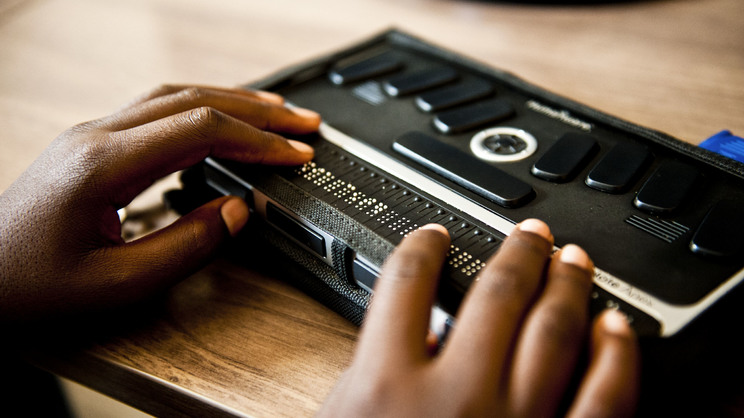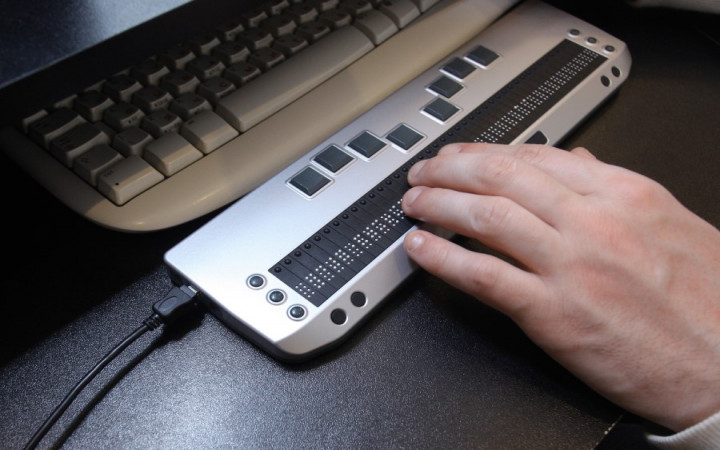Empowering Freedom With Assistive Modern Technology for the Blind
The assimilation of assistive technology into the lives of individuals with aesthetic problems stands for a significant innovation in advertising independence and self-sufficiency. From cutting-edge screen viewers to advanced smart walking canes, these tools not just enhance day-to-day navigating and communication yet likewise encourage individuals to involve meaningfully in various facets of life. As we discover the myriad benefits and real-world applications of these modern technologies, it ends up being vital to take a look at the underlying aspects that add to their performance and the potential for future growths in this crucial field.
Summary of Assistive Innovation

The growth of assistive innovation is grounded in principles of inclusivity and empowerment. Technologies in software, equipment, and sensory improvements offer customers with choices customized to their particular needs. From display visitors that convert text to speech, to responsive gadgets that share details through touch, these devices transform the way people engage with their surroundings.
In addition to practical applications, assistive modern technology promotes better social inclusion and participation in numerous industries, including education and employment (Mobility aids for visually impaired users). As study and growth continue to evolve, the potential for assistive modern technology to better enhance the lives of aesthetically damaged individuals stays encouraging, paving the means for an extra equitable society where every person can prosper
Types of Assistive Instruments
A variety of assistive gadgets have actually emerged to sustain people with aesthetic problems, each developed to fulfill particular demands and enhance everyday performance. These tools range from low-tech services to modern innovations, offering diverse choices for customers.
Low-tech gadgets consist of magnifiers and large-print products that assist in reading and writing. Braille tools, such as Braille styluses and slates, allow responsive reading and communication. Alignment and wheelchair help, like white canes, assist customers navigate their atmosphere securely.
On the greater end of the spectrum, digital zoom systems and display viewers supply significant support. Digital magnifiers allow individuals to expand text and pictures on displays, while display viewers transform digital web content right into manufactured speech, assisting in accessibility to info on smart devices and computer systems.
Smart device applications additionally play an important function, offering functions like text recognition and navigation help. Wearable modern technology, such as clever glasses furnished with augmented fact, is becoming an appealing tool to improve situational awareness.
Benefits of Assistive Technology
The combination of assistive innovation dramatically boosts the high quality of life for individuals with visual impairments. These modern technologies encourage individuals by advertising self-reliance, enabling them to navigate their environments more efficiently and execute day-to-day tasks with greater convenience. As an example, screen viewers and magnification software permit people to access digital info, fostering instructional and specialist opportunities that might have formerly run out reach.
Additionally, assistive tools such as clever walking canes and general practitioners applications give real-time navigating assistance, improving movement and safety. This boosted autonomy not just enhances self-esteem however likewise urges social engagement, allowing individuals to take part even more totally in their communities.
Assistive technology additionally assists in communication, aiding users get in touch with others via voice recognition and text-to-speech applications. This ability is crucial for keeping relationships and accessing important details.
Additionally, the customization options available with lots of assistive technologies guarantee that individuals can customize tools to their particular needs, even more improving use and efficiency. In general, the benefits of assistive modern technology for individuals with aesthetic problems are profound, promoting an extra inclusive society visit site where everybody can seek their desires and goals.
Instance Research Studies and Success Stories
Highlighting the transformative influence of assistive technology, many case research studies illustrate how individuals with visual problems have efficiently integrated these tools right into their day-to-day lives. One engaging example entails an university pupil that utilized screen reading software to browse on-line sources and academic materials properly. This innovation not only promoted her education yet additionally enhanced her self-confidence in getting involved in discussions and team tasks.
An additional case research includes an expert who uses a mobile phone application created for navigating original site and things recognition. By utilizing this application, he has actually gained back freedom in both his individual and workplace, enabling him to commute separately and involve with associates more effectively.
Additionally, a retired person shared her experience with braille e-readers, which enabled her to access a huge array of literature and stay connected with her neighborhood through book clubs.
These success tales highlight the crucial role of assistive modern technology in cultivating freedom, enhancing top quality of life, and promoting social combination for individuals with aesthetic disabilities (Speech-to-text devices for low vision). By embracing these cutting-edge tools, customers can conquer challenges and take opportunities that add to their individual and expert gratification

Future Fads in Assistive Modern Technology
Technology in assistive technology is positioned to redefine the landscape of assistance for people with aesthetic disabilities. Arising trends stress the combination of man-made knowledge (AI) and artificial intelligence, which enhance the functionality of gadgets that aid with navigating and details availability. For instance, AI-driven applications are currently efficient in analyzing aesthetic data in real-time, enabling users to involve with their setting more individually.
Moreover, the development of wearable innovation is advancing quickly. Smart glasses furnished with augmented reality (AR) can supply audio descriptions of environments, transforming exactly how customers engage with public areas. These gadgets not only promote freedom but likewise foster social inclusion.
Additionally, the Net of Check This Out Things (IoT) is making homes smarter, permitting seamless connectivity in between assistive devices and day-to-day appliances. This connection equips users by allowing automatic responses and voice-activated controls tailored to private requirements.
Conclusion
In conclusion, assistive technology plays a pivotal duty in encouraging people with aesthetic disabilities by boosting their self-reliance and interaction with their environments. The varied series of devices and applications available not just assists in navigation and interaction yet also advertises social combination and opportunities for individual and professional development. As developments proceed in this field, the potential for improving the top quality of life for those with visual problems will expand, promoting greater autonomy and empowerment.

Comments on “Mobility Aids for Visually Impaired Users: Traveling the World with Confidence”